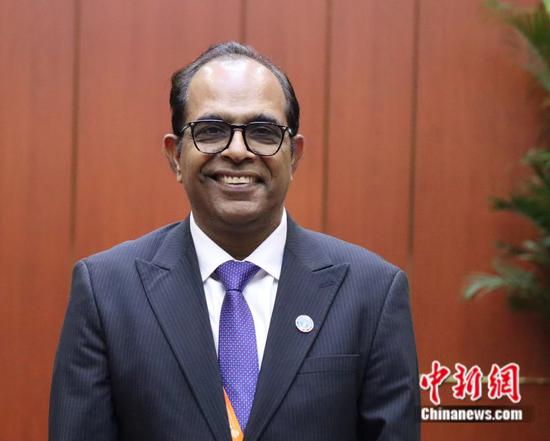Insights | China's experience strengthens global agricultural supply chains for sustainability: FAO Representative
By Chen Tianhao, Zhao Li
(ECNS)-- China's innovative practices in green agricultural development provide valuable insights for the world, said Vinod Ahuja, the representative ad interim of the Food and Agriculture Organization (FAO) of the United Nations for China, in an exclusive interview with China News Network at the ongoing Second China International Supply Chain Expo (CISCE) in Beijing on Wednesday.
Transforming Agriculture is Imperative
Ahuja noted that agriculture is increasingly under pressure from challenges such as climate change, overexploitation of natural resources, and the impacts of geopolitical conflicts on food systems. According to statistics, over 700 million people worldwide remained hungry in 2023. "That's a very big number," he said.
“Given the pressures that we face,the evolution of technology, and changing consumer demands and consumer patterns, we believe that our food systems need to go through a transformation," Ahuja remarked.
He emphasized that a critical aspect of this transformation is the greening of agriculture, including reducing its carbon and water footprints and making supply chains more sustainable.
He highlighted China's significant progress in technological innovation, stressing that spreading these innovations globally while learning from other countries' experiences to accelerate China's own innovation is one of FAO's primary objectives in working with China.
"So, it's a two-way process," Ahuja added. "We are here to work with China, for China and from China."

China's Contributions Offer Global Insights
Discussing China's role in sustainable agricultural development, Ahuja pointed out that the country has made significant contributions in technology, agricultural practices, and policy innovation.
He particularly emphasized China's success in integrating environmental standards into its development policies. This innovative policy approach, he said, provides valuable lessons for the world.
"I think China has offered a number of solutions, and we have a number of lessons that we can take forward. So, we are now also going to do a comparative study of domestic policies across China, India, the U.S., Japan, Europe, so that we can see how different countries are dealing with these common challenges,” Ahuja stated.
"Different countries are dealing with it in a different context and in their own ways, but there are lessons that we can learn from each other,” he added.
He also highlighted China's significant progress in reducing agricultural pollution. For example, concerns over the use of inorganic fertilizers and their impact on soil and water quality have been widespread.
However, through the promotion of biological fertilizers and other sustainable practices, China has successfully improved soil health and water resources. These experiences, Ahuja noted, could serve as important references for regions like South Asia and Africa, where the adoption of such technologies faces more challenges.
Achieving a “Win-Win” Outcome with Food Security and Green Development
Ahuja highly praised China’s dual approach to ensuring food security and achieving green development.
He believes that the goals of food security and carbon neutrality are not mutually exclusive but can be pursued simultaneously through comprehensive policies.
"I think we have the knowledge and the technologies. It's just that we need an integrated policy that can drive both food security as well as green development,”Ahuja said.
“I think China has introduced a number of very innovative policy measures that we can learn from,” he noted.
Ahuja pointed out that China has successfully balanced the demands for food security and green development through policy innovation, demonstrating that achieving a "win-win" outcome is possible.
Looking ahead, Ahuja expressed strong confidence in the continued collaboration between FAO and China. He emphasized that China's experience in green agricultural transformation is incredibly valuable, and FAO will continue to work closely with China to promote the global sharing of technologies and policies.
